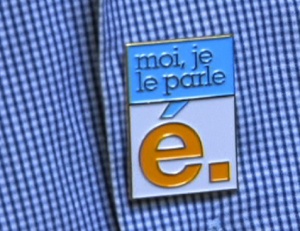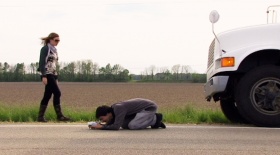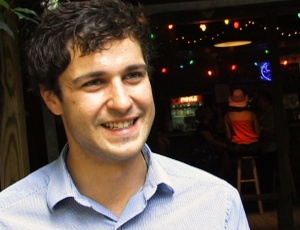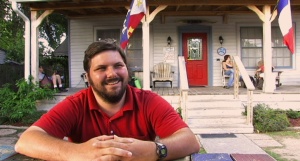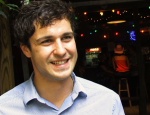Louisiana Today—Living in Two Languages (1)
par Piccinin, Helgi
Louisiana today is experiencing a resurgence of interest in francophone culture and heritage after a long period of decline, primarily due to the requirement to attend school in English. This forced transformation led to adoption of many elements of American culture and the English language in every sphere of society so that English is now the first language spoken in Louisiana, and the number of people who state that they speak French at home has greatly diminished. However, since 1968, the possibility of obtaining instruction in French has been reintroduced into Louisiana schools, and the French-speaking minority is working to ensure a future that includes preservation of their unique culture. A noteworthy point: among youth, the French language, presented in a positive light, is largely propagated through arts and culture. Videographer Helgi Piccinin gave this matter his close attention.
Article disponible en français : La Louisiane aujourd’hui : vivre en deux langues (1)
After a crash course in Louisiana history, from its founding by Europeans through to the linguistic struggles of the 20th century, it is time to turn back to the present. When we asked Zachary Richard about the current status of French in Louisiana shortly after our arrival, the conversation went something like this: "How goes the battle? It's tough." Yet the surprising thing about Louisiana is that despite the challenges, people don't give up-and the rising generation is no exception. The young people I talked to left me with a distinct impression of caring about their heritage. Far from playing the role of victims, they have chosen to act. After all, they are the ones who will have to deal with these challenges in the context of the 21st century.
Louisiana Today...
During our first week in Louisiana, I had the opportunity to meet three very interesting members of the new generation of Louisiana French speaker - two Louisianans and one Acadian - at a gathering organized by the Centre de la Francophonie des Amériques [International French-language Centre of the Americas]. Each of them is actively contributing in their own way to redefining Louisiana's French-language identity.
Stephen Juan Ortego
Stephen is a young Louisiana French speaker with an entrepreneurial bent. A career architect who has specialised in environmentally-friendly architectural design, he is also the co-founder of In finé Moi, Je Le Parle. This fledgling operation provides French translation services and is developing an online network and business portal that offer services in both languages. Its aim is to "better insert [Louisiana] into the global cultural economy by attracting French-speaking, as well as domestic tourists, while promoting and sustaining French-language culture."(NOTE 1) Outgoing, energetic and full of ideas, Stephen embodies the modern Cajun, who is light years removed from the old "Coonass" stereotype of the poor, illiterate farmer or fisherman long associated with Louisiana French speakers. His pride is palpable. For Stephen, being Cajun, French speaking and different are strengths to build on rather than signs of inferiority to be kept hidden. But as he explains, even though it's "cool to be Cajun" today, this hasn't always been the case.
![]() FRENCH LANGUAGE VIDEO 1: Stephen Ortego on the Shame or Pride in being Cajun Today; 1 min. 25 sec.
FRENCH LANGUAGE VIDEO 1: Stephen Ortego on the Shame or Pride in being Cajun Today; 1 min. 25 sec.
From Cause for Shame to Source of Pride: on Being a Louisiana French Speaker Today
The shame Stephen Juan Ortego talks about was something I noticed on severalo ccasions. People could speak French, but were sometimes shy about doing so, either because they felt it belonged in the home or that theirs simply wasn't "proper". Nor does it help matters that for most Louisianans, English is their first language.
![]() FRENCH LANGUAGE VIDEO 2: Trahan, Michot and Clement's Perspectives on the Shame Associated with Speaking French in Louisiana; 2 min. 47 sec.
FRENCH LANGUAGE VIDEO 2: Trahan, Michot and Clement's Perspectives on the Shame Associated with Speaking French in Louisiana; 2 min. 47 sec.
This feeling of shame is understandable. You can't ask an entire generation that grew up being punished for speaking French to suddenly stand up and proudly use a language that once marginalised them. No more than you can ask the same of the lost generation of children whose parents did not pass the language on in order to "protect" them, and who often had to battle the odds in their efforts to reclaim their own identity. Identity issues are bound to give rise to ambiguous feelings in circumstances like this. But how does the new, outward-looking generation, a generation proud of its differences, feel about its identity? I asked Rocky McKeon to explain.
Rocky McKeon, Deconstructing Clichés to Create an Authentic Identity
Musical artist with a unique trademark blend of styles artists and language activist, Rocky has more than one string to his bow when it comes to fighting for the survival of an authentic French-language culture in Louisiana. A poet, a musician with the group Isle Dernière [Last Island] (www.islederniere.com) and a rapper on the side (La Brise du Bayou [Breeze from the Bayou]), he is also the creator of the web series Le Chausson Show (hosted by none other than Rocky's hand decked out in a sock puppet!(NOTE 2)) and the Tabloïd Cadien (celebrity news in Cajun French) (www.tabloidcadien.com). Rocky is a very active player in his efforts to bring Louisiana French-language culture into the 21st century - and his views have reinvigorated the identity debate. "If something exists in English, it should exist in Louisiana French. A language shouldn't be limited to folklore."(NOTE 3) He also contributed actively to the very first Cajun and Creole dictionary, the Dictionary of Louisiana French, published in 2009.
Although my conversation with Rocky was much too short (and it took place before I had really learned who he was), he left a strong impression on me. Despite his criticisms of certain aspects of CODOFIL's work (see the video from the previous article), he has certainly benefited from some of the organisation's achievements: he was able to study French in highschool and at university and to take part in an international exchange in Belgium to further improve his French. Yet even as he acknowledges that these tools have helped him learn French, it is not enough: "[...] je parlais comme l'autre bord, je parlais pas comme la Louisiane." [I spoke like they do over there, not like [they do] in Louisiana].
![]() FRENCH LANGUAGE VIDEO 3: Rocky McKeon on which French to Speak; 40 sec.
FRENCH LANGUAGE VIDEO 3: Rocky McKeon on which French to Speak; 40 sec.
Rocky McKeon's is a man on a mission whose aim is to develop Louisiana's French culture and language in a way that makes them relevant today. A bit of a provocateur, he likes to play with clichés, deconstructing them to avoid becoming imprisoned by a "folklorised" version of his own culture.
J'sus ni américain, ni acadien.
Je reste pas dans une cabane sus le bayou
Je joue ni l'accordéon, ni le violon.
Je prend pas une pirogue pour aller tout partout non plus.
[I ain't American, nor Acadian
Don't live in a shack on the bayou,
Don't play accordion or violin
Or get around in a pirogue, too].
(Excerpt from the poem Mon nom c'est Rocky)
Using humour to drive debate on certain issues, Rocky is well aware of the risks of cultural folkorisation. Like Rachelle Dugas, who we meet below, he is pinning his hopes on Louisiana being selected to host the Acadian World Congress in 2014.
An Acadian Perspective: Rachelle Dugas
![]() FRENCH LANGUAGE VIDEO 4: Rachelle Dugas on Acadian Identity and Cajun Similarities; 3 min. 23 sec.
FRENCH LANGUAGE VIDEO 4: Rachelle Dugas on Acadian Identity and Cajun Similarities; 3 min. 23 sec.
Rachelle isn't from Louisiana, she's Acadian. But she has been working in Louisiana for a number of years and is the person championing Lafayette's bid to host the Acadian World Congress in 2014. What may sound like just another convention bid is anything but that for Rachelle. She explains that holding the event in Lafayette is of crucial importance, for it is an opportunity to "light a spark" without which Louisiana's French-language community could be reduced to little more than a quaint shadow of itself within a few years. Citing the same fears as Rocky McKeon, she confides,"Without the congress, it will probably be just another tourist thing. And the tourism will be based on something that isn't at all authentic."
![]() FRENCH LANGUAGE VIDEO 5: Rachelle Dugas on the Importance of the Acadian Congress; 4 min. 18 sec.
FRENCH LANGUAGE VIDEO 5: Rachelle Dugas on the Importance of the Acadian Congress; 4 min. 18 sec.
The Struggle Continues with an Arsenal of New Tools
Over the course of my conversations with these young people, each of whom is striving in their own way to promote the development of Louisiana's French-language culture, I gained a new level of understanding of the state I was coming to know. The danger I had felt looming since my arrival (which my conversations with these young people had only served to confirm) was that a new phase of the struggle was about to begin. First their great-grandparents and grandparents had lost their language by being forced to go to English schools and then their parents had fought to have French gradually reinstated into school curriculum as early as 1968. However, by then, many Louisianans had already lost the language or only retained as mattering of their grandparents' mother tongue. Today, nobody will reprimand you for speaking French or for having Cajun or Creole roots, but who will encourage you? There is a danger that Louisiana will become "Disneyfied." It was a threat I had already sensed without being able to pin it down. Now, Stephen, Rocky and Rachelle fight on, each in their own way, as they draw on their respective strengths as entrepreneur, artist and event organiser in the fight to ensure that Louisiana's French-language culture continues to develop in an authentic and relevant way.
But is it possible nowadays to live in two languages in the USA? (Read Article 5)
Helgi Piccinin
Vidéo Eldorado
NOTES
Note 2: http://www.youtube.com/jeanlecouillon#p/u/13/z6t5EAwqoOI
Note 3: http://mondesfrancophones.com/author/rmckeon/
Additional DocumentsSome documents require an additional plugin to be consulted
Images
-
 En panne dans les cha
En panne dans les cha
mps de l’état d... -
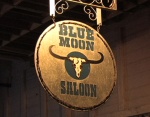 Enseigne du Blue Moon
Enseigne du Blue Moon
Saloon -
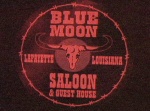 Enseigne illuminée du
Enseigne illuminée du
Blue Moon Salo... -
 L’entrée du bar et au
L’entrée du bar et au
berge le Blue M...
-
 La longue route du Mi
La longue route du Mi
ssissipi vaut l... -
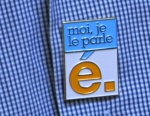 Le logo du projet fra
Le logo du projet fra
ncolouisiane -
 Rachelle Dugas, une A
Rachelle Dugas, une A
cadienne en Lou... -
 Rocky McKeon au Blue
Rocky McKeon au Blue
Moon à Lafayett...
Vidéos
-
 La «hontesse» selon Trahan, Michot et Clement (2min47sec)
La «hontesse» selon Trahan, Michot et Clement (2min47sec)
-
 Rachelle Dugas expliquant l'importance du congrès acadien (4min18sec)
Rachelle Dugas expliquant l'importance du congrès acadien (4min18sec)
-
 Rachelle Dugas: identité acadienne et ressemblances avec cadiens (3min23sec)
Rachelle Dugas: identité acadienne et ressemblances avec cadiens (3min23sec)
-
 Rocky McKeon: parler le français... mais lequel? (40sec)
Rocky McKeon: parler le français... mais lequel? (40sec)
-
 Steven Ortego: Honte ou fierté d'être cadien aujourd'hui (1min 25sec)
Steven Ortego: Honte ou fierté d'être cadien aujourd'hui (1min 25sec)

